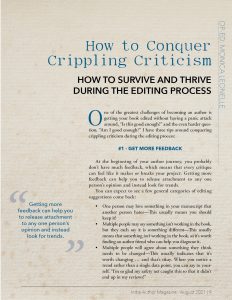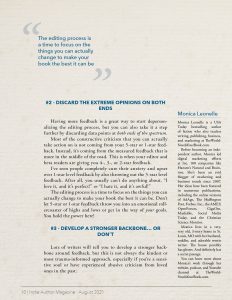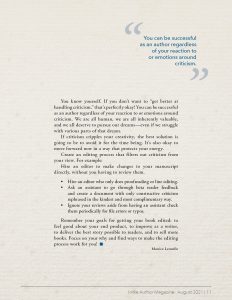How to Survive and Thrive During the Editing Process
One of the greatest challenges of becoming an author is getting your book edited without having a panic attack around, “Is this good enough?” and the even harder question, “Am I good enough?” I have three tips around conquering crippling criticism during the editing process:
#1 - Get More Feedback
At the beginning of your author journey, you probably don’t have much feedback, which means that every critique can feel like it makes or breaks your project. Getting more feedback can help you to release attachment to any one person’s opinion and instead look for trends.
You can expect to see a few general categories of editing suggestions come back:
- One person may love something in your manuscript that another person hates—This usually means you should keep it!
- Multiple people may say something isn’t working in the book, but they each say it is something different—This usually means that something isn’t working in the book, so it’s worth finding an author friend who can help you diagnose it.
- Multiple people will agree about something they think needs to be changed—This usually indicates that it’s worth changing … and that’s okay. When you notice a trend rather than a single data point, you can say to yourself, “I’m so glad my safety net caught this so that it didn’t end up in my reviews!”
#2 - Discard the Extreme Opinions on Both Ends
Having more feedback is a great way to start depersonalizing the editing process, but you can also take it a step further by discarding data points at both ends of the spectrum.
Most of the constructive criticism that you can actually take action on is not coming from your 5-star or 1-star feedback. Instead, it’s coming from the measured feedback that is more in the middle of the road. This is when your editor and beta readers are giving you 4-, 3-, or 2-star feedback.
I’ve seen people completely cure their anxiety and upset over 1-star level feedback by also throwing out the 5-star level feedback. After all, you usually can’t do anything about, “I love it, and it’s perfect!” or “I hate it, and it’s awful!”
The editing process is a time to focus on the things you can actually change to make your book the best it can be. Don’t let 5-star or 1-star feedback throw you into an emotional rollercoaster of highs and lows or get in the way of your goals. You hold the power here!
#3 - Develop a Stronger Backbone… or Don’t
Lots of writers will tell you to develop a stronger backbone around feedback, but this is not always the kindest or most trauma-informed approach, especially if you’re a sensitive soul or have experienced abusive criticism from loved ones in the past.
You know yourself. If you don’t want to “get better at handling criticism,” that’s perfectly okay! You can be successful as an author regardless of your reaction to or emotions around criticism. We are all human, we are all inherently valuable, and we all deserve to pursue our dreams—even if we struggle with various parts of that dream.
If criticism cripples your creativity, the best solution is going to be to avoid it for the time being. It’s also okay to move forward now in a way that protects your energy.
Create an editing process that filters out criticism from your view. For example:
- Hire an editor to make changes to your manuscript directly, without you having to review them.
- Hire an editor who only does proofreading or line editing.
- Ask an assistant to go through beta reader feedback and create a document with only constructive criticism rephrased in the kindest and most complimentary way.
- Ignore your reviews aside from having an assistant check them periodically for file errors or typos.
Remember your goals for getting your book edited: to feel good about your end product, to improve as a writer, to deliver the best story possible to readers, and to sell more books. Focus on your why and find ways to make the editing process work for you!
Monica Leonelle




